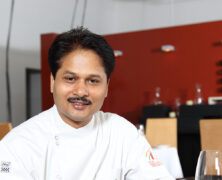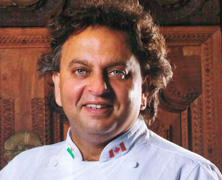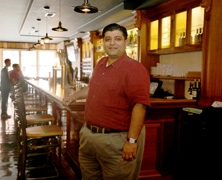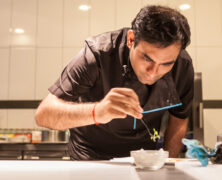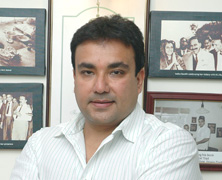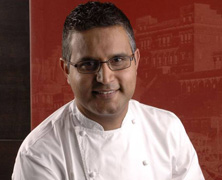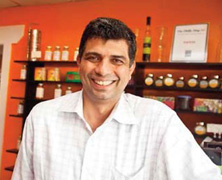By Rupali Dean For those who don’t know Chef & Restaurateur Abhijit Saha, he’s one of India’s most forward-thinking culinary masters and restaurant pioneers. He was rated ‘Best Chef of India’ at the 2013 Indian Restaurant Congress & Awards and has long been blazing the modernist trail in Bangalore with two restaurants, Caperberry and Fava. Caperberry was Abhijit’s first venture as a chef-entrepreneur in 2009. Based on an avant garde style of cooking, the menu at Caperberry is inspired primarily by modern Spanish and Italian cuisines. Abhijit’s other Bangalore-based restaurant, Fava, is a completely different concept with only a 100 seats and boasting favourites from Mediterranean cuisine in a smart casual environment. Both establishments are staples of the Bangalore dining scene and trail-blazing in their execution. “I think it’s all about having the right opportunity at the right place at the right time.” Abhijit’s most recent venture, the much talked about SAHA Signature Indian Restaurant and Terrace Bar, opened in June 2014 and was a joint project with local partners Buyan Pte Ltd. By catering to the discerning and sophisticated diners of Singapore, Abhijit earned one of the highest accolades in his first year from the Singapore Restaurant Association, who selected his establishment as the “Best New Restaurant of Singapore, 2014”. The modernist approach to regional Indian cuisine employs the latest culinary techniques and focuses on exceptional aesthetic presentation. The menu also has a section dedicated to some of the classic dishes of traditional Indian cuisine but with a modern twist. The alfresco Terrace Bar area allows guests to enjoy unique eclectic cocktails infused with Indian flavors, alongside a variety of Indian-style tapas. Abhit shares the following thoughts regarding SAHA’s success: “Singapore is one of the most exciting food and beverage markets in Asia,...
Kausik Roy’s Refreshing Approach...
posted by admin
Like many great culinary forces, chef/restaurateur Kausik Roy fell in love with food at an early age. When he was a small boy, his mother was recovering from a broken leg and unable to stand for long periods of time. She recruited him to help her in the kitchen and it was under her watchful eye that his fist hands-on culinary training began. In Kausik’s own words, “My “ah-ha” moment was at the age of 9 when I refused to eat the okra dish that was put in front of me at the family table. I just knew that the soggy and slimy vegetable had more to offer and a flash of inspiration hit me. I urged my family to deep-fry the okra and add a generous sprinkling of hari mirch (green chili). Everyone instantly loved it and “Karrarri Bhindi” became a mainstay on our family table, and eventually, on my restaurant menus.” “I am happiest cooking locally grown vegetables.” In early 2000, Kausik opened his first restaurant “Brick Lane Curry House” with Sati Sharma. While he teamed up with several partners after that for various ventures, he believes that “his best competition is himself”. Rather than worrying about the success of other restaurateurs, Kausik focuses on creating exceptional restaurants and setting his own standard. Tawa in CT is already a huge success with loyal customers that love the regional specialties and traditional Indian stand-bys like chicken tikka masala. Kausik’s emphasis is on changing the way Americans think about Indian cuisine – he doesn’t live or operate by preconceived notions and instead chooses to focus on entertaining customers and ensuring they leave his establishment happy. His next venture will be the Masala Library, an Indian restaurant in the competitive NYC market. Kausik gets an...
Surfy Rahman & K.N. Vinod – Turning Heads in Washington D.C....
posted by admin
Teamwork and vision are buzzwords echoed throughout our nation’s capital. Perhaps no place exemplifies this better than famed restaurant, Indique, the brainchild of Surfy Rahman and K.N. Vinod. This talented duo has been turning heads in Washington D.C., as individuals across party lines can agree on at least one thing: Indique is the standard by which Indian cuisine should be measured. “Hearing an ‘I’ll be back soon’ announcement from a satisfied and happy guest is music to our ears.” Surfy Rahman and K.N. Vinod have been bringing smiles to customer’s faces for over two decades and there is no end in sight. In the early 1990’s, Indian cuisine was at the infancy stage of making its big splash in the restaurant scene. Surfy and K.N. saw a gap in the market and plunged head first following a “if you build it, they will come” mentality – people didn’t just come, but were knocking down the door to get in. Even from their first endeavor, Bombay Bistro, their restaurants became a destination spot for the who’s who in the U.S. and abroad. Patrons included former Secretary of State, Madeline Albright, top members of congress, and ambassadors from the far reaches of the globe. They were even asked to host events like “Club des Chefs des Chefs,” a gathering of international chefs catering to Presidents, Kings and Queens, etc. Their fame and success is grounded in a strong partnership and truly mutual admiration. Both have an entrepreneur’s mentality and work-ethic, but it’s in their differences where they are perfect compliments. Chef Vinod embodies all of the classic traits of an artist – creativity, energy, diligence, and a true perfectionist. Mr. Rahman provides the balance with his outgoing and passionate persona, and a front of the house...
Vikram Vij: A Canadian Inspiration...
posted by admin
Vikram Vij grew up in India, but it didn’t take long for his travel instincts to kick in. Studying hotel management in Austria, working in Vienna, and ultimately moving to Vancouver, Vikram eventually made a name for himself in Canada. In 1994, Vikram opened his first restaurant, Vij’s, in Vancouver and was soon joined in the business by his wife, Meera. Today, he is a chef and owner of the restaurants Vij’s and Rangoli in Vancouver, and is an investor in the Canadian reality show “Dragon’s Den”. “I want customers to feel just as taken care of as if they were in their best friend’s home.” Ever since he was a child, Vikram wanted to be a Bollywood stage actor. But his father was not supportive of the idea, so he channeled his energies towards becoming a chef. He was drawn to the restaurant industry because he felt like it was the closest thing to being on stage all the time – it required performing at all levels and avoiding bringing personal issues to the working environment. He found his love for performing and entertaining could extend to restaurants and it allowed him to thrive in an industry that he never would have considered. When Vikram arrived in Vancouver, he found it to be a young and vibrant multicultural city. He loved the fact that so many Indians lived there and although he had come to the city by himself, he never felt alone. The fact that people thought of Indian food as a delicious and a complex cuisine led him to believe that an Indian restaurant was not only much-needed in Vancover, but essential to his success. His passion and love for food, entertaining, and making people happy catapulted his restaurants to the...
Sati Sharma: The Building Bricks of a Restaurateur...
posted by admin
Sati Sharma is the owner of Paratha Junction and Brick Lane Curry House, with several restaurant locations in NYC and NJ. Like many successful restaurateurs, Sati employed the approach of taking traditional dishes and wrapping them in an interesting city-worthy concept. English-influenced Brick Lane represents old world tradition, reminding patrons of an English curry house that serves honest and authentic Indian food and a variety of mild and spicy curries . His other venture, Paratha Junction, is more Indian comfort food, but done in a way that reminds customers of home-cooked goodness. Sati’s signature style is clearly evident in his establishments and creates an atmosphere that customers are repeatedly drawn to. ” We try out new specials pretty much every week at my restaurants.” Sati always had a strong love for food. As a young child, he took numerous road trips throughout India with his family and was exposed to a great variety of dishes and tastes. It was his extensive travel that was so influential in opening his mind and curiosity to the world of cooking. In keeping with influences from various regions, one of the most notable dishes at Sati’s Brick Lane restaurants is the “phaal”, a super spicy curry that’s very popular in England. Sati remarks that “we’ve taken this dish is taken to a completely different level” with unique chillis that have so much heat the chefs have to wear a protective mask when cooking it. It’s not for the faint of heart, but it’s a curry that really opens the senses to what spices can taste like. While he loves tradition, Sati also believes in coming up with new recipes often: “We try out new specials pretty much every week at my restaurants. You have to keep experimenting and...
Hemant Bhagwani – Taking Toronto to New Territory...
posted by admin
Hemant Bhagwani has left footprints in quite a few places – born in India, attending culinary school in Switzerland, working at Indian restaurants in Australia and Dubai. But when he finally found a place to put down his chef’s hat, it was in Toronto, Canada where Indian restaurants at the time were nothing more than standard buffets with greasy fare. After helping open several hotel restaurants in Dubai, Hemant was set on starting his own venture despite the warnings of friends of family about the high failure rate for new food establishments. Arriving in Canada without much money, he tried relentlessly to get a small business loan before finally securing funds for his first restaurant. Like many entrepreneurs, Hemant struggled with his first two ventures despite hard work and a brilliant vision before succeeding with Amaya. Founded in 2007, the Amaya Group of Restaurants has become a household name in Toronto today, bringing fresh, healthy, and quality Indian food in the form of formal restaurants, casual dining, food court kiosks, take-out establishments, and catering services. Hemant claims his love for food changed when he went to an Indian restaurant one night in Vancouver. Waiting close to an hour for a table, he observed how the owner chatted with everyone, hugged old friends, and transformed a simple dining venue to a warm and hospitable experience. Recognizing that same passion and energy in himself, Hemant was confident in his vision of wanting to create a place that offered exceptional food and changed how people perceived Indian dining. Amaya is exactly that – a company that was built from scratch out of love and emotion, a venture that redefined Indian food in Toronto, and a way for people to connect. “The key to success…my staff is like...
Why Everyone is Gaga for Gaggan Anand...
posted by admin
Chef, restaurateur, pioneer. Three huge titles for an extraordinary talent from Kalkota who interestingly made a name for himself in Bangkok. Chef Gaggan Anand worked at the Taj Group in his younger days and came to Thailand in 2007 as the head chef at contemporary Indian restaurant Red Bangkok. Quickly earning recognition for his exceptional cooking, industry insiders were already comparing Gaggan’s creations to that of chefs at established Michelin-starred restaurants. When he finally ventured out with his own restaurant, “Gaggan’, he experienced the freedom to create truly inspired dishes that were representative of his passion, commitment and creativity. Today, Chef Gaggan is one of the world’s most respected Indian chefs – while his restaurant is only 2 years old, it is the only Indian restaurant to be included (No. 66) in the Top 100 List of the World’s Best Restaurants. “Gaggan” is also ranked No. 3 in a 2014 list of Asia’s 50 Best Restaurants. So what makes this superstar such a standout? Perhaps it’s his desire to retain the authenticity of Indian food even though his approach is so decidedly innovative. Perhaps it’s the fact that he put Indian cuisine on the map in an environment so different from his native India. Or perhaps it’s his approachable and down-to-earth style despite his numerous achievements and accolades. Whichever it is, Chef Gaggan has made it clear that legendary is within his reach. “Trying new recipes, improving old recipes, it’s a continuous process and I find ways to keep getting inspired.” Gaggan’s restaurant is set in a colonial-style wooden house in the heart of downtown Bangkok with cuisine that he describes as progressive Indian with traditional touches. While his cooking style can be thought of “modern”, “futuristic” and “deconstructive”, Gaggan is quick to point...
Getting Close to Gaurav Anand...
posted by admin
Gaurav Anand, chef and owner of three acclaimed Indian restaurants in Manhattan, has achieved unquestionable success despite having no formal culinary training and only arriving in the U.S. less than ten years ago. Born in India, Gaurav studied business and law, only discovering his love for the restaurant industry after working with his brother Saurabh. In 2006, Gaurav came to New York city and opened Bhatti Indian Grill, a restaurant that quickly became known among foodies and was an Open Table Diners’ Choice in 2012. The latest addition to his growing empire was Moti Mahal Delux, the first U.S. location of a popular New Delhi–based chain with more than 100 locations in India, Nepal, and London. The cuisine here is both rich and balanced, with complex flavors and interesting spices, and as global franchisers of Moti Mahal Delux, the Anand brothers are looking to open other locations in New York City as well as other metro areas. “You need to have a dream, and a passion to implement it.” Gaurav first came to New York City (NYC) for his 2 loves – his wife Shagun who was working there at the time, and the abundance of restaurants and interesting food. He knew that if he wanted to make it in the restaurant business, he would need to be in this incredible city where there are so many opportunities. When asked what he thought made NYC a good place to start, he expressed, “This is a good place to open an Indian restaurant because there are never enough restaurants here. New Yorkers will always want to eat out, and as long as you are serving high quality food at reasonable prices, you have a shot.” His experience, however, has been very different from what he...
Nitu Singh: A Food-Forward Outlook...
posted by admin
As the owner of Antuns restaurant in Long Island, 2 Benares restaurant locations, and the Minar fast food chain in NYC, Nitu Singh has certainly accomplished an impressive amount. Growing up in New Delhi, he spent endless hours in the kitchen watching his mother prepare nightly family meals and learning from his father who was already in the restaurant business. Nitu worked in the family restaurant to learn everything he could and eventually used that knowledge to open Minar in midtown Manhattan. Singh loves using all different Indian spices in his cooking, noting that every spice has its own identity and significance in making Indian cuisine unique. As an owner, he makes sure to partner with his staff and chefs to ensure each restaurant runs flawlessly and customer satisfaction remains high. The love he puts into cooking and managing every aspect of restaurant operations are two things he believes continue to drive the success of his establishments. Unlike many restaurants, Singh tries to stay true to his mission of making Indian cuisine accessible to the masses by focusing on quality and affordability over fancy décor and overpriced dishes. When asked what his favorite thing is about being a restaurant owner, Singh answered, “It’s the immense pleasure I get from cooking and providing people with scrumptious food. I like using my work as a stress relief. Cooking has been my passion for as long as I can remember and I love that competition in the industry today continues to make the cuisine better.” Singh continues to draw inspiration from his parents as his father was one of the first to introduce Indian food to the New York and his mother was a constant daily influence. But over the years, he also continues to be motivated...
Monish Gujral: Running an Empire...
posted by admin
Monish Gujral understands the importance of tradition, heritage, and family pride. Inheriting the Moti Mahal chain of restaurants started by his grandfather, Monish is the face of an empire that boasts over 100 franchisee locations in India. What started as the first Indian restaurant to introduce tandoori cuisine to the world, has now gotten a contemporary makeover courtesy of Monish’s vision and passion. Monish has kept the signature dishes that make Moti Mahal an institution in Delhi, but has transformed the dining experience into one that elevates the chain to a whole new level. “Food is a universal language that crosses all borders and barriers” From the start, Monish was enamored by what he perceived as the glamorous restaurant industry, based on his grandfather’s innovation and fame. While he later discovered just how tough the restaurant business really is, and how much hard work is involved, he continued to find it fascinating. He started out as a trainee at Moti Mahal, working in the hot kitchen for three years during college and learning the importance of consistency in commercial cooking. Although it might seem that pursuing a career in food was a given in his family, Monish found his own connection to the work, “Food is one thing that connects everyone no matter which religion or country they belong to. It’s a universal language that crosses all borders. When I’m cooking, it’s like meditation and yoga for me. I’m totally in sync with what’s going on and it really de-stresses me. That’s a language I can relate to.” Monish loves traveling to observe new cooking styles and different cuisines. He describes himself as “an experimental chef” in which he takes a recipe and tries to add in his own ingredients to reflect his personal...
Balancing it All: Atul Kochhar...
posted by admin
Our February Restaurateur of the Month, Atul Kochhar, is a man of many talents. An Indian-born, British-based chef, Atul is also a successful restaurateur, cookbook author and television personality. Most notably, his modern and fresh take on Indian cooking has had a tremendous influence on changing the way the British – and the rest of the Western world – view Indian cuisine. “I’ve tried to stick to my principles…the end result is dishes presented in a modern, clean and visually arresting way.” Atul came from a humble background in Jamshedpur, India. Both his grandfather and father were in the food business, running a bakery and catering operation, so food was always a big part of his life growing up. From as early as he can remember, Atul was in love with the industry and knew he wanted to pursue a career as a chef and restaurateur. Furthermore, his roots instilled in him a respect for the products and ingredients he works with, reminding him of the care, thought, and precision that quality dishes require. At just 31 years old, Atul became the first Indian chef to receive a Michelin star in 2001 during his tenure as Head Chef at Tamarind. He left the following year to embark on his first solo venture in London, Benares, which has been touted as one of the world’s best Indian restaurants since its opening in 2003. The focus here is on using seasonal ingredients from “all corners of India” and combining tradition with modern approaches. The restaurant also features a “grazing menu” in which Atul provides guests the opportunity to sample his signature items. As a testament to the quality of food, Atul won a second Michelin star for Benares, putting him in a league that few other...
Munish Narula: An Empire in the Making...
posted by admin
One look at Munish Narula’s empire of Philly restaurants and it’s clear why we chose him as the January “Restaurateur of the Month”. With a vision for restaurants that serves him well all on its own, Munish’s success is additionally backed by a strong business background. He formerly worked as an Investment Banker and has a Bachelor of Science in Hotel Restaurant Management, an MS in Hospitality Administration from Johnson & Wales University, and an MBA in Finance from Wharton. Although he originally got his start in the food business at a chain restaurant, Munish eventually went on to found the acclaimed Karma restaurant in Philadelphia. Shortly afterwards, he realized the demand for fresh, nutritious Indian food at affordable prices and decided to launch Tiffin.com. “Our focus is on expanding the Tiffin brand and making it a regional chain.” While Tiffin started as an online delivery only concept run out of a small store front, it quickly evolved into a multi-functioning restaurant taking online orders, and offering delivery and carry-out. Based on the success of the initial store, Munish has since opened several other locations around Philadelphia. His most recent venture is Tashan, a beautiful 5,000 square foot restaurant serving sophisticated Indian small plates. When we asked Munish what inspired him to apply the tapas concept to Indian cuisine, he said, “Small plates allows people to try many more menu items than they would otherwise. It works especially well for people who are trying Indian food for the first time and we try to send a constant flow of food to the table so they can enjoy the experience as much as the tastes.” In an effort to stay innovative and on top of trends in the restaurant industry, Munish regularly visits...
From Entertainer to Restaurateur: Vijay Rao...
posted by admin
Raised in Nadiad, India, Vijay Rao had two big dreams: to one day own a restaurant and to make Bollywood films. He was always passionate about entertaining and interacting with people, so the restaurant business was a natural fit. Meeting so many interesting guests who become regular patrons and friends appealed to him and he believed there was no greater satisfaction than when a guest compliments the food and ambience of your establishment. With the vision to open a premier Indian restaurant in NYC, but without being a chef himself as many restaurateurs are, Rao wanted to break the myth that India was old-fashioned and not modernized. So in 2011, he worked with renowned Chef Hemant Mathur and Chef Dhandu Ram to create the Michelin-starred Tulsi, a true testament to the concept of modern Indian in everything from the contemporary décor to creative cuisine. Although Tulsi was a great success, Rao’s passion for Bollywood and film hadn’t yet been fulfilled. The answer to his passion was the opening of Dhoom in 2013, which is a Bollywood-themed restaurant in New Jersey where the entire décor is set up to reflect elements of Indian cinema. From film memorabilia to photos of famous actors, Dhoom invites patrons to celebrate Indian entertainment and Indian food in one unique setting. “There is still some apprehension when it comes to trying Indian dishes, but I’m confident we will eventually break this barrier and eliminate existing misconceptions.” Rao may not have a culinary background, but he certainly understands how to create and deliver great dining experiences. When asked what he thinks is missing from the Indian restaurant industry in America, he says, “I think we have achieved the right levels of class, food, and ambience to compete with other ethnic restaurants....
The Innovator: Rajesh Bhardwaj...
posted by admin
Rajesh Bhardwaj, founder of the acclaimed Junoon restaurant in NYC, is our November Restaurateur of the Month for very good reason. Born and raised in New Delhi, Rajesh is seen as a pioneer in Indian cuisine with a track record of running cutting edge restaurants. After graduating from the Institute of Hotel Management, Catering & Nutrition (IHMCN) in New Delhi, he received his Masters in Hospitality Management from the International School of Tourism Sciences in Rome, Italy. With extensive experience in hospitality with the ITDC Group and Taj Group of Hotels already under his belt, Rajesh came to the United States with a definite vision. Rajesh began with a small restaurant in Queens in 1997 and co-founded Café Spice, an establishment that grew into a chain of Indian bistros and changed the landscape of Indian cuisine in this country. When he opened Junoon in 2011, his inspiration was to create a contemporary restaurant that offered a complete dining experience in all aspects – great ambiance, service and cuisine. While he recognized that quality cuisine is the most important factor in any restaurant, he wanted to tackle the challenge of maintaining the core of what makes traditional food so tasty with the desire to break away and give dishes a modern interpretation. He thought of it as the “future of classic cuisine” and brought together a team that shared his unique vision. Rajesh emphasizes that he “constantly challenges his culinary team to be innovative and different in their approach.” ” I think the new breed of restaurateurs should follow the path of innovation, adopting new and modern techniques without fear of rejection.” When it comes to being inspired in his own life, Rajesh credits people from all stages of his life. As a child, inspiration came...
Rohit Khattar: The Joy of Working Hard...
posted by admin
Rohit Khattar is Chairman & Managing Director of Old World Hospitality Private Limited, India’s largest live entertainment organizer. Old World Hospitality operates three hotels, two convention and performing arts centers and over thirty restaurants. While his very first restaurant, ‘Chor Bizarre,’ is still as much in demand 23 years after opening, his latest venture, ‘Indian Accent’, continues making waves in the culinary scene and has earned him Restaurateur of the Month honors. Rohit is a bit of a modern-day renaissance man, having excelled in a breadth of industries from food to hospitality to entertainment. Having studied Hotel & Restaurant Management in the United States, he developed an all-encompassing focus on the consumer experience. Rohit believes the most successful recipe for a business is “conjuring up the concept and then balancing every ingredient that goes into making that concept successful.” He is heavily involved in all aspects of planning including design, selecting chefs and managers, and hiring staff. Though his time is split across seemingly different industries, Rohit believes producing a film and producing a restaurant are not all that dissimilar. Each focuses on creating a show for the audience and working tirelessly to ensure the details are not overlooked. It’s interesting that what may seem as exhausting and time-consuming to many people, comes naturally to Rohit. His strong personal connection to each industry has transformed into a labor of love. Growing up in Kashmir, Rohit used to find himself spending much of his time at his grandfather’s cinema watching the latest films. These days, his hours limit him to only two movies per week, but he is just as fanatic as ever about the next great production or watching a timeless classic. “The hours are simply too taxing for entrepreneurs to succeed without loving their craft.”...

